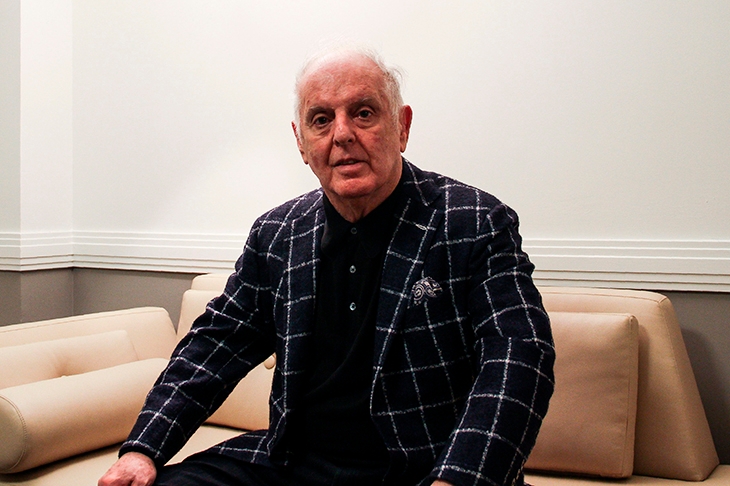A few years ago, I hooked up with a BBC team in Berlin to record a programme with Daniel Barenboim. We were shown in to his spartan offices at the Staatsoper and, without preliminaries, I conducted an interview with him across a low table for 45 minutes. When our time was up, Barenboim rose and left. I am not even sure if we shook hands.
Knowing him from previous encounters, I was not particularly bothered. What did shock me was the sight of my BBC colleagues, their faces white with stress, their limbs rendered catatonic. No one creates tension in a room like Daniel Barenboim.
Last month, seven musicians in his Staatsoper orchestra complained of a threatening atmosphere at work and added charges of bullying which, in post-#MeToo times, have to be taken very seriously. One man, the principal timpanist, said things got so bad he had to be put on medication. Barenboim hit back, saying, ‘If I treated him so unfairly, why did he stay here for 12 or 13 years?’ He went on to accuse unnamed enemies of trying to sabotage his Berlin contract renewal. ‘I would know if there were tensions,’ said Barenboim tersely. An official investigation has been ordered.
The case has ramifications far beyond the conducting podium. Barenboim, 76, took up his baton around the time the screaming had to stop. Tantrums thrown by Toscanini, Koussevitzky, Fritz Reiner and George Szell were no longer tolerated by the late 1970s. Georg Solti, who started out as an old-style screamer, simmered down into a shrewd musical psychologist.
I remember Riccardo Muti letting rip once at the Philharmonia with a visceral rage, but someone must have had a word in his ear (today he swears he never shouted). Barenboim learned quickly that he could not rule by fear. He told me in 1982 that he regretted the loss of authority suffered by headmasters. It meant conductors had to find other ways of getting things done.
Barenboim’s generation replaced dictatorial terror with mental pressure. The genial Claudio Abbado would say nothing in rehearsal but, as he left, would drop a name in the manager’s ear and a certain musician would be de-rostered for his next visit. Zubin Mehta, unfailingly agreeable and workmanlike, used orchestra managers as his hatchet men. The fear is still there; it just got more subtle.
Barenboim switches the charm on and off, throwing a masterswitch if he does not get his way fast enough. When he conducted a Ring cycle at the Proms in 2013 he behaved so abusively to members of the BBC production team that tears streaked some very experienced cheeks. Whether he knew he had gone too far, or he had to be told, he made amends by taking the entire crew out to dinner after the final show. Like many former prodigies, he has never outgrown infantile tantrums.
But the #MeToo aftermath has left Barenboim and others sounding out of tune with the times. A new maestro breed has developed different approaches. Kirill Petrenko, incoming chief of the Berlin Philharmonic, hangs out in bars with musicians after a performance. Mirga Grazinyte-Tyla invites players to her dressing room for an after-concert singsong. Yannick Nézet-Séguin at the Metropolitan Opera freely admits his errors in post-mortem sessions with the players. It would seem that younger conductors have found a consensual mode to achieve results in an age when title exerts no fear.
In 2019, when junior MPs on the government side stand up to deride the prime minister, open-plan office clerks bring down the heads of great companies and Sir Alex Ferguson’s hairdryer has been officially laid to rest, conductors are expected to maintain the collaboration of 100 musicians without drawing a single complaint, a daunting task on an increasingly uneven playing field. Chairmen of major PLCs still control the boardroom by threats of dismissal. Prime ministers reshuffle their cabinets. Football managers are seen every Saturday yelling at teenage players who are surely more deserving of protection than unionised musicians. Yet managers like Jose Mourinho are spared the media heat that has been blasted at Barenboim, and that hypocrisy needs to be called out. Many who deplore bullying might even feel a smidge of sympathy for the seriously embattled conductor.
It may not be enough to earn Barenboim a contract extension from 2022, when he will be 80 years old. What we have learned from the outcry is that Barenboim may be the last of his kind, a beached maestro whose beat has fallen behind fast-changing times. The shrewdest political conductor we have ever seen has failed to read the writing on the Facebook wall.






Comments